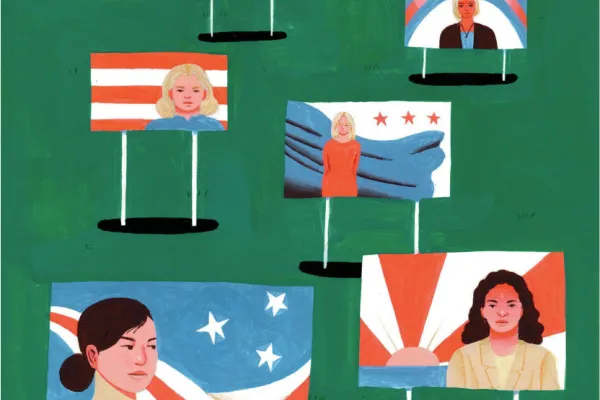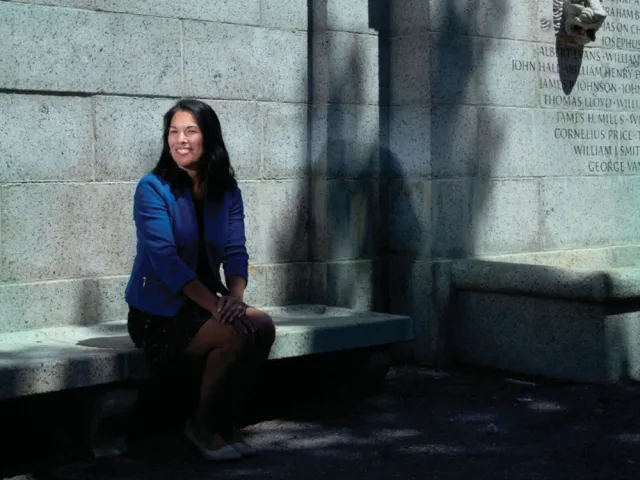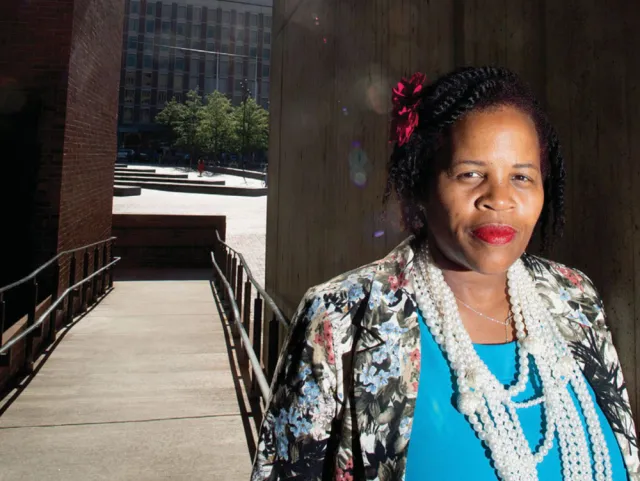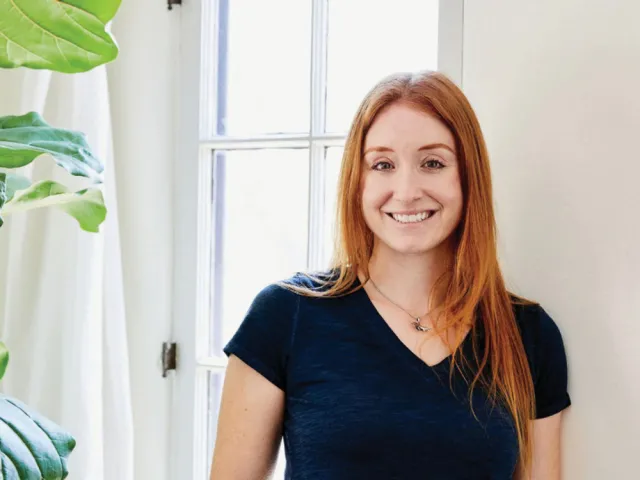Balance at the Ballot Box
Alum News

Published September 15, 2018
Growing up, Keiko Matsudo Orrall ’89 didn’t see herself as a leader. Public service runs in her family—her uncles fought for the United States during World War II in a segregated unit of Japanese Americans—but Orrall never considered jumping into the public arena until her junior year at Smith.
That’s when her friend Noriko Sato Ward ’88 urged her to follow in her footsteps and run for class president. She even showed her how to put together a successful campaign. “She saw my ability to lead,” Orrall says. “I ran to provide leadership that would strengthen our relationships as classmates and highlight our enthusiasm as Smithies.”

Keiko Matsudo Orrall ’89 was the first Asian American woman to be elected to the Massachusetts House of Representatives. Now, with a message of fiscal restraint, she’s running as the Republican candidate for state treasurer. Photograph by Dana Smith.
Later, Orrall would draw on the confidence she gained from that first run for office to take on successively bigger challenges. In 2000, at age 33, she was elected to the town finance committee in Lakeville, Massachusetts, where she learned she could stand up for her principles without alienating colleagues. “There were some controversial votes, and I found I can have a different opinion,” she says, recalling a debate about a potential land purchase. “I raised my hand, voted in opposition and survived.”
In 2011, Orrall became the first Asian American woman elected to the Massachusetts House of Representatives. Today, she is the Republican candidate for Massachusetts state treasurer, promising to bring a fiscally conservative approach to state finances. “Getting involved at the local level gives you a taste of what you can really achieve,” she says. “I saw that and thought, ‘Why don’t I try for more?’”
Orrall is one in a bumper crop of Smith alumnae vying for political office—from local school boards to statehouses—in a record-breaking year for female candidates. Nationwide, more than 600 women—the most ever—launched campaigns for the U.S. House, U.S. Senate or governor, according to the Center for American Women and Politics (CAWP) at Rutgers University. And like Orrall, women from both sides of the political aisle are overcoming their initial hesitancy as they learn to see themselves as leaders who are ready to face the heightened scrutiny that women candidates encounter.
“Getting involved at the local level gives you a taste of what you can really achieve,” she says. “I saw that and thought, ‘Why don’t I try for more?’”
As is typical for midterm elections, the opposition party is particularly galvanized. But this election cycle stands out for the number of Democratic women, including many political novices, who are running. They are angered, they say, by destructive policies directed at reproductive rights, health care and gun violence. They are energized by the #MeToo movement and the massive women’s marches held as soon as President Trump took office. Some 340 Democratic women are running for seats in the U.S. House, surpassing the previous record of 190 in 2012. On the Republican side, 116 women filed to compete for House seats by June, compared to the peak of 128 Republican women entering House races in 2010. Roughly 67 percent of women running for Congress this year made it through their primaries or didn’t have a primary challenger.
Some analysts are drawing comparisons to 1992, when a record number of women won seats in the U.S. House and four more women were elected to the U.S. Senate. One motivation for voters that year was Anita Hill’s treatment during confirmation hearings for Supreme Court Justice Clarence Thomas. “The Anita Hill incident raised awareness about the kind of indignities that women are subjected to by a predominantly white male government that doesn’t take women’s concerns seriously,” says Carrie Baker, professor of the study of women and gender at Smith.
Baker believes a similar dynamic is happening now, triggered by events from the Access Hollywood recording of President Trump to the rollback of civil rights protections. “One issue after another has been knocking the ground out from underneath women,” Baker says. “Women are seeing the impact that’s having, and they’re pissed.
That’s creating a grassroots movement inspiring women to run for office.” Democratic voters are receptive. A recent NBC News/Wall Street Journal poll found nearly 90 percent of Democrats believe the country would be better off with more women in office; 49 percent of Republicans report feeling that way.
‘I Had To Do Something’
Smith women running for office reflect these trends. Some, like Wisconsin Sen. Tammy Baldwin ’84, are up for re-election, while many more are putting their names on the ballot for the first time. “I’ve been concerned that people are losing faith in democracy,” says Liv Coleman ’01, a political science professor and Democratic candidate for the Florida House of Representatives. “I’ve always been politically active, but it’s my recent growing concerns about democracy that caused me to become involved. I really felt I had to do something.”
The state of national politics, along with a sense that her district in Boston was at a crossroads, also motivated community organizer Kim Janey AC ’98. “I needed to take my advocacy and my activism to the next level, so I could have a greater impact on the issues I was fighting for,” says Janey, who won a seat last November on the Boston City Council in her first political race. Her priorities include affordable housing and eliminating the opportunity and achievement gaps in public schools.

In her first run for political office, Kim Janey AC ’98 was elected last fall to the Boston City Council. The Community organizer names her key issues as affordable housing and addressing the achievement gap in public schools. Photograph by Mark Ostow
One of the most electrifying races for women came during the June primaries, when newcomer Alexandria Ocasio-Cortez unseated 10-term incumbent Joseph Crowley for a U.S. House seat in New York. Observers said Ocasio-Cortez came out of nowhere, but in fact her insurgent, grassroots-style campaign was run by Virginia Ramos Rios ’94, a government major at Smith who had previously worked as an organizer for presidential candidate Bernie Sanders. “It has been exhilarating, exhausting and life changing,” Ramos Rios says. “It feels amazing to have been part of the team that showed our nation and the world that this is possible.” With the primary behind her, Ramos Rios is now focusing on an effort to register 20,000 voters before the general election. “Our goal,” she says, “is to establish a bottom-up way of doing politics.
Others have been through the campaign experience before. Attorney Maria Mazzeo Syms ’89, a Republican, is running for re-election after serving in the Arizona House of Representatives since 2016. Her accomplishments include sponsoring legislation requiring mandatory testing of rape kits. On her website, she cites her key issues as education, job growth, public safety, saving taxpayers money and securing the
border to address the violence, smuggling and other problems “associated with a porous border,” Syms writes. “I will not fail in doing everything I can at the state level to provide Arizonans with the peace of mind that comes with a secure border.”
Still others, like Orrall, have won elections in past years and are seeking higher or different offices. Lauren Arthur ’10 completed two terms in the Missouri House of Representatives before grabbing headlines in May, when she won a special election for the state Senate, flipping a seat from Republican to Democrat. A middle school teacher, she saw firsthand how decisions made at the state level were hurting her students’ opportunities for a better future. “I also recognized that women were seriously underrepresented in the state-house,” Arthur says. “When I was first elected, I was the only woman in her 20s in the legislature. I believe it’s important that legislators reflect the populations they represent, and I thought I could offer a different perspective.”
“I needed to take my advocacy and my activism to the next level, so I could have a greater impact on the issues.”
Arthur’s wasn’t the only contest with Smith alumnae to have attracted national attention. Leecia Eve ’86, a Democratic candidate for New York attorney general, has vowed to continue a high-profile lawsuit against the Donald J. Trump Foundation if elected. Eve, who must first survive a September primary, has long had political ambitions. She worked as deputy economic development secretary for New York Gov. Andrew Cuomo, and earlier served as an aide to Joe Biden and Hillary Clinton when both were U.S. senators. “Right now, the most important issue is fighting against the assault from Washington on our basic rights—everything from our reproductive rights to the rights of immigrants and to civil, labor and voting rights,” Eve says. She’s excited to see more female candidates because it “means more smart, experienced and dedicated people in public office.”
Toward Equal Representation
There’s no question women remain vastly underrepresented in state legislatures, governors’ mansions and Congress. In 2017, more than 80 percent of members of Congress were male. So would electing more women really make a difference? Congressional women say yes.
A 2017 CAWP study based on interviews with women senators, representatives and delegates of the 114th Congress found that women in office are more collaborative than their male counterparts and more likely to work across party lines. The study says they see themselves as “more results-oriented, more likely to emphasize achievement over ego and more concerned about achieving policy outcomes rather than receiving publicity or credit.” Women of color also emphasized the importance of having an array of diverse perspectives in policymaking.
Celinda Lake ’75, a researcher and strategist for the Democratic Party, stresses that if electing more women candidates is a goal, then women voters are essential. For the midterm elections, women “absolutely will determine who wins,” Lake says. “In close races, women are the key swing votes.”
Women officeholders, Lake notes, bring different priorities and experiences to the job. But to get elected, women have to overcome obstacles that men don’t face, according to research from the nonpartisan Barbara Lee Family Foundation. To get elected, a man doesn’t have to be seen as likable, while likability can make or break a woman’s candidacy. Similarly, voters don’t require men to prove they are qualified, but women must, the research says.
Women candidates also face scrutiny in ways that men seldom have to tolerate. “It’s much harder for a woman in a debate to be aggressive, to attack, without suffering a backlash that the woman is hysterical, she’s not poised,” says Howard Gold, Smith professor of government. He points to well-documented biases in media coverage of women candidates. “There’s disproportionate attention to appearance—to hair, to shoes, to clothing. You never see that among male candidates.”
Given these prevailing attitudes, women themselves may question their own qualifications to run for public office. For them, Lauren Arthur has this advice: “Do it! You have the network and tools you need to succeed, and you are eminently qualified,” she says. “There’s a popular joke in politics: The first week you’re in office, you look around and think, ‘How did I get here?’ The second week you’re in office, you look around and think, ‘How did everyone else get here?’ Don’t let self-doubt prevent you from getting involved.”
In her first run for political office, Kim Janey AC ’98 was elected last fall to the Boston City Council. The community organizer names her key issues as affordable housing and addressing the achievement gap in public schools.
Women Running As Women
While there are cases of outright misogyny against women candidates, especially online, some attitudes that hold women back are more subtle. Take views on motherhood. A voter might find a male candidate more appealing if he’s a dad with young children, while the same voter may balk at electing a mom with young kids. Campaign advisers for Betsy Humphries Holland ’97, an executive with Turner Broadcasting and candidate for the Georgia House of Representatives, debated how much to highlight her role as the mother of a 6-year-old. They worried that even progressive voters might have “an unconscious expectation that women should wait until their children are grown be- fore pursuing politics,” Holland says. In the end, she decided not only to talk about her son but to bring him along as she knocked on doors. “My experience as a mom is a big component of what makes me an effective candidate. [It gives me] firsthand experience with public schools, searching for child care, navigating health care and saving for college. I’d rather highlight that than hide it.” One sign of progress for parents: The Federal Election Commission recently ruled that federal candidates may use campaign funds to pay for child care while running for office.
Seemingly archaic notions about gender persist to a surprising degree. Boston City Councilor Kim Janey says some argued that if she won, then a black man would no longer serve on the council. “It was sad because it was very divisive,” Janey says. “I was not interested in getting into debates that would pit black women against black men. Nor was I interested in this assumption that a black woman could not serve this district well, that a black woman somehow would not care about young black boys. … That is offensive to all the moms out there who are raising their sons as they grow into strong young black men.”
“To truly change the way politics works, we need to help support different types of people who run.”
Smith women have found their biographies can be powerful assets to their candidacy, and their experiences give them insights that could help them govern. Chelsea Kline AC ’07, an administrator and educator at Bay Path University and community religious adviser for Jewish students at Smith, felt compelled to run for the Massachusetts Senate partly to be a voice for those struggling to get by. Once a single teen mom, Kline earned her Smith degree as an adult while taking care of her mother, who had cancer. “The most profound moments have been when I’m speaking casually with people in my district,” she says about her campaign. “There’s an instant connection when they know that I was a single teen parent, or when they know that I’ve worked really, really hard to get to where I am.”
“It was 30 degrees on a Saturday, and we knocked on something crazy, like 500 doors,” she says. “Smith women are amazing.”
As a woman candidate, Kline notes that women tend to open up to her about deeply personal experiences. “People I’ve spoken to are really ready and eager for more balanced representation and gender equality,” she says. She credits Smith with inspiring her to seek out “big and important work,” and sees this moment as a time for strong leaders to emerge. “If it’s not me, then who?”
Tough as it is, campaigning can bring unexpected joys. Attorney Anne Martin ’89, newly elected Chancery Court Judge in Davidson County, Tennessee, calls running for office “the most wonderful, horrible thing I’ve ever done.” The upside was getting to know the broad racial, ethnic and religious diversity of her constituency. She got support from friends, too, including five from Smith who flew in one weekend to help her meet voters. “It was 30 degrees on a Saturday, and we knocked on something crazy, like 500 doors,” she says. “Smith women are amazing.”
Another Smith woman drawn to run for local office is Satya Rhodes-Conway ’94, candidate for mayor in Madison, Wisconsin, and former city council member there. Local government, she says, is where change can happen right now, especially when legislation stalls at the state or federal level. “Local governments can be laboratories of democracy,” she says. “We can try things at the local level. We can see if they work. And if they do work, they can be translated upward to state and federal governments.” Affordable housing, an issue that vexes many municipalities, is one of her top issues. If elected, Rhodes-Conway will be Madison’s second woman and first openly lesbian mayor.
Fundraising Dilemma
Of course, not all who run will win. Volcanologist Jess Mencer Phoenix ’04 engaged new voters with her messages about scientific research and climate change, and The New York Times, Wired and Mother Jones all wrote stories about her quest to unseat an anti-science incumbent in California’s 25th Congressional District in the U.S. House. But she finished fourth in the Democratic primary after a yearlong effort. She attributes the defeat partly to the role of money in American politics and the amount of fundraising required to get out her message.

Jess Mencer Phoenix ’04 mounted an energetic campaign for California’s 25th district and focused on the need for climate research. She came up short in a crowded primary field and cites the fundraising challenges that women candidates face. Photograph by Amanda Friedman
The typical model for a Congressional race is “sitting in a windowless room for 10 to 12 hours a day and dialing rich people,” Phoenix says. “I rejected that pay-to-play model and said I’m going to run a grassroots campaign because that’s where I believe the future of politics is.” To that end, she says, Smith women need to support candidates they believe in.
“If we want to truly change the way politics works, we need to help support different types of people who run,” Phoenix says. “That means financial support, volunteer hours and old-fashioned activism.”
Even if women candidates are disproportionately successful this year, Congress will likely remain 75 percent male, cautions Smith professor Howard Gold. It will be a long time before we see parity at the national level, he says, because Congressional candidates are often recruited from the pool of state and local politicians, where women remain underrepresented.
Still, with more women on the ballot at all levels this year, the pool of potential candidates is bound to grow.
In California, Rachel Payne ’97, a technology executive and entrepreneur, ran for Congress but dropped out of her crowded race to support other Democrats. For her, Hillary Clinton’s presidential loss was a catalyst. It showed her the importance of making sure women’s representation and political power continue to grow. “The level of misogyny and what I call ‘bro-toxic’ culture that is everywhere now” began in that election, Payne contends. Clinton, she says, “was vilified and demonized in a way that still happens because there are fewer women and so they’re easier to attack.”
As more women throw their hats into the ring, Payne says, “it’s harder to defeat us because we’re everywhere. And that’s what we have to do. We have to be everywhere.”
This story appears in the Fall 2018 issue of the Smith Alumnae Quarterly.
Andrea Cooper ’83 is a frequent contributor to the SAQ.
Read More
‘I Could Be The One To Make Change’
Alumnae candidates are answering the call to leadership by campaigning for offices up and down the ballot. Their issues may differ, but all say they are driven to stregthening their communities.
Illustration by Celia Jacobs